Home>A look back at the 2025-2026 academic year opening ceremony
24.09.2025
A look back at the 2025-2026 academic year opening ceremony
On Thursday, 28 August 2025, Sciences Po's School of Research welcomed its new students during its formal opening ceremony in the Jacques Chapsal lecture theatre. This inaugural event, led by Dean Dina Waked in the presence of the teaching staff, aimed to present the main themes for the coming year, encourage discussion and remind students of the resources available to them.
Speech by Dina Waked, Dean of the School of Research
Dear students, colleagues and staff
It is my privilege to welcome you for a new academic year at Sciences Po’s School of Research.
I warmly congratulate all of you who are starting their degrees at the School of Research – whether you are pursuing a master’s or a doctoral degree, you have come a long way in your quest for further research. I also want to welcome those returning for another year, it is always a pleasure to see you again.
As our Director has just reminded us of the community you are joining at Sciences Po, I would like, in my role as Dean of the School of Research, to speak more specifically about what it means to embark on a path of research —a path defined by a relentless quest to search, to question, and to deepen our understanding of the world.
This quest is unique in its ambition, essential for the world we live in, and fundamental to the journey you are about to engage in.
When you chose this path, it was not only out of ambition but I assume also because something intrigued you: a looming question, an unexplored field, an observation of reality you wished to unpack. You came here with curiosity and confidence in your ability to engage with that question, to explore what has not yet been explored, to shed light where little exists or to reaffirm and strengthen existing findings. For some of you, this will be a journey of two years; for others, it will occupy you for many more. And for most, I hope, it will become a lifelong pursuit that will extend well beyond your years at this institution.
This path matters not only for you but for the world we live in.
Research begins with questions. As you pursue them, you will encounter a plethora of answers and findings – some will sit well with you, others will unsettle you. Keep searching, continue probing, ask harder questions and dig deeper. Rely on facts, but double check these facts (many are generated by AI today). Look to alternative accounts, double check and triple check your sources. Be rigorous in your scientific method. If you do fieldwork, ask more people the same questions. If you do empirical work, gather more data from different sources. And if you look into theory, read not only the writers and scholars that are known – look for those lesser known, and ask why their research was cast outside the mainstream.
Today, in the age of AI, many answers can be found at the click of a button. Writing can be done by machines, and information retrieved instantly from outside the classroom.
So what, then, does a School of Research offer you? We offer you something no machine can replace: the ability to ask the question that will help you understand, expand, analyze and connect phenomena and issues. At the School of Research you will explore ways to ask your questions, learn how you frame your research, how you sharpen your methods, how you engage with the literature—especially the texts that challenge your findings—and how you keep pushing with further questions.
In a world torn by conflict, war, famine and poverty – from Palestine, to Ukraine, Sudan, and many other corners of the globe – some of these questions are difficult to ask. Yet it is precisely now that asking them matters most.
You might be discouraged from pursuing your research. You might be pressured to stay within the mainstream. To follow the orthodoxy. Your work might even be accused of being too critical or ideological. Yet, it is important to look at the issue from all perspectives. Always remember the politics of knowledge production. And use that awareness to make your research better, sharper, more inclusive so it can confront any possible critiques.
As we witness in many places around the world researchers under attack, academics feared, universities underfunded, and academic freedoms curtailed, we are privileged that we live in a county that assures these freedoms. Do not let fear be the precursor of the eradication of these privileges. And always remember, that academic freedoms protect you – know your rights and of course your duties and responsibilities that come with it. Do not let anyone, stop you from researching and exploring deeper a topic you want to unpack and arrive at its core with integrity, with respect for others, and with a sense of responsibility for the impact of your work.
In my graduation speech a few weeks ago I urged the graduates to speak truth to power as they join the world beyond of the security of the walls of the university. But to be able to speak truth to power, you need to have done the work, earned this right, done the research that supports the truth you want to uphold. Without solid research, solid in its methods, critical in its engagement with opposing views, you will not be able to speak truth to power. Research and asking the unsettling questions is the first step. Then you need to have courage to narrate.
Narrate alternatives – use the classics in your field, but also use the literature left out. Use the methods accepted by your discipline, but educate yourself on the history of your field, why did some methods get cast aside. Why are we doing things like this now, and not like that. Ask whether it can be done differently?
Be experimental – try new methods, new tools, read forgotten texts.
In the sciences, some of the most important discoveries began with questions that were not the ones researchers initially set out to answer. For example, research on the life-saving Covid vaccines, did not begin with Covid-19 in mind, but critical researchers dared to ask whether their work could be applied in new ways—and it changed the course of the pandemic.
In the humanities and social sciences, the questions are just as fundamental and the potential for transformative insights just as great. Many of you might in your work grapple with the pressing reality of inequality, asking why the world continues to grow more unequal (an issue that has occupied me in my own work for more than 2 decades).
In economics, you may study development strategies, interest rates, mortgages, and growth models that shape the distribution of wealth. In law, you will examine how rules of property, contract, and market regulations channel resources toward some, while excluding others. In sociology, you may explore inequalities in class, gender, race, and social mobility. In political science, you might analyze how power struggles, institutions, and wars perpetuate unequal outcomes. In history, you will trace these inequalities back to their roots—colonialism, slavery, conquest, and the economic orders they created.
Always remember, you can explore these issues across disciplines – not in silos, as in the real world they do not exist in the disciplinary confinements. Cross over to economics if you are in law, to sociology if you are in political sciences, and always look to history. Talk to your colleagues and professors in other disciplines. This will enrich your research and sharpen your impact. At Sciences Po you can do precisely that.
You are in a privileged position – many unfortunately around world are not. You have earned being here, but you have also benefitted of many privileges that got you here. Acknowledge them. Know that many others are denied this privilege. This, I hope, will humble you and also make you adamant to not waste this privilege – be courageous to narrate, give yourself the permission to do so. Do not let fear dictate your research.
Sciences Po is a unique place to do research. Our school brings together both master and doctoral students – spanning Sciences Po’s five primary disciplines: economics, history, law, political science, and sociology. It is home to more than 250 academics, experts in their fields and close to 1000 staff members. This diversity and interdisciplinarity offer each one of us, part of the School of Research, a rich environment of intellectual exchange, where different perspectives can be mutually explored to tackle complex global challenges broadening our collective understanding of the world.
It is an institution that benefits from being in France, while also being a global university, open to the world. It is bilingual – fostering rich exchanges across cultures. It offers those who graduate from here a privileged access to positions of power—use that power, starting today and every day after.
It is also an institution that protects you: from harassment, from discrimination, from abuse in any form. Do not hesitate to call upon these protections when you need them; they exist for you.
At Sciences Po you will also find communities that encourage and support you. Look around you, I hope you forge bonds that are strong, that share your ideals, but that also challenge you and push you to work harder, to sharpen and enrich your research, those that hold you to excellence. Only excellence will grant you the position of power to change – the minds of others, laws, policies, and ultimately the world.
I would like to leave you with metaphor I think about a lot : Research, to me, is like a kite. In 2011, the late Palestinian poet and professor Refaat Alareer—killed in Gaza in 2023 – wrote a poem that has circled the globe and was translated into more than a dozen languages. In it, he speaks of a kite as a symbol of memory, love, and hope, that rises against the wind, not drifting with it. For me, this image captures what research is about: not something carried lightly by the wind or the current, but something that rises above it. For me, research aspires to rise above the storm, solid in its methods, advancing knowledge, bringing hope, sometimes telling the stories that might otherwise be silenced, refusing to disappear into forgetfulness. When I write, I often imagine that kite – you might too.
I wish you all courage, curiosity, and the determination to ask the hardest questions.
Welcome to the School of Research.
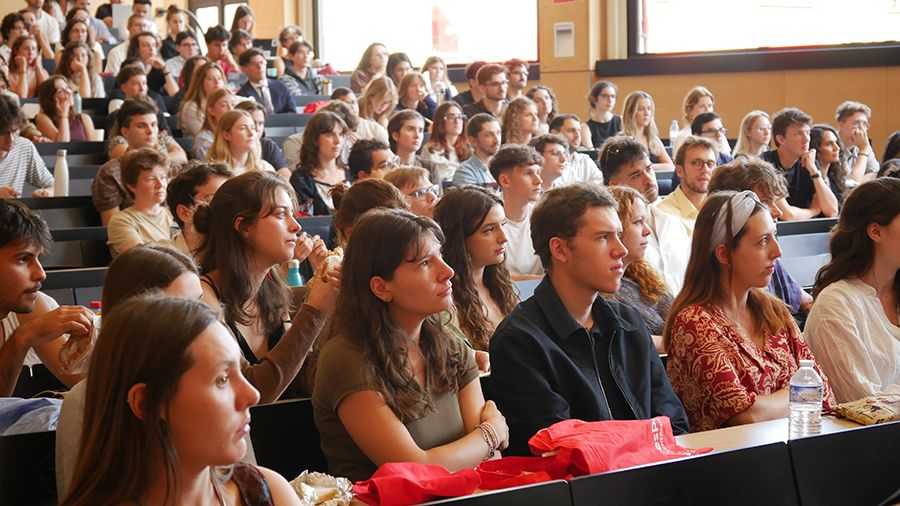
Ceremonial opening of the School of Research
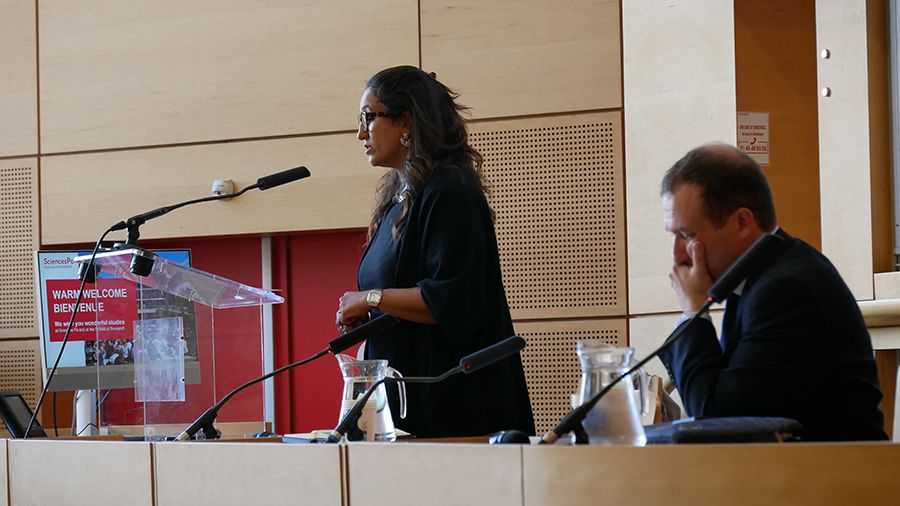
Speech by our Dean, Dina Waked
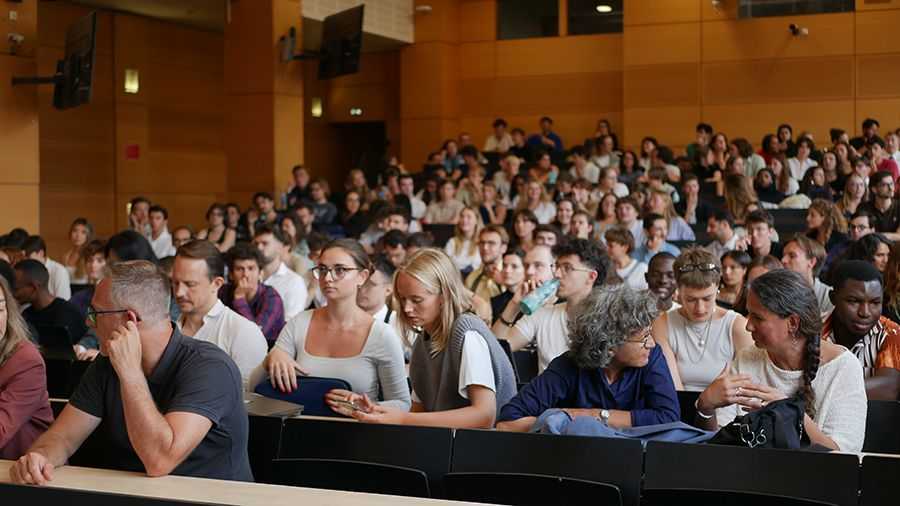
Ceremonial opening of the School of Research
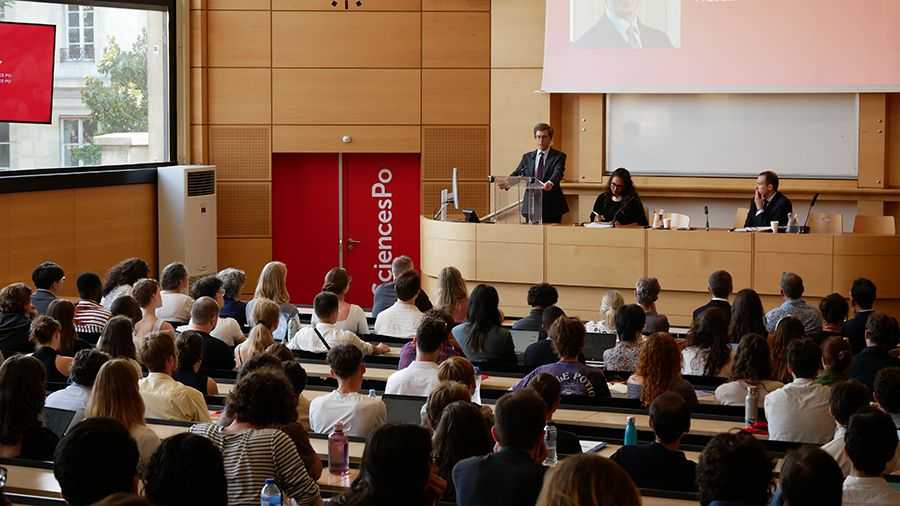
Speech by Luis Vassy, Director of Sciences Po
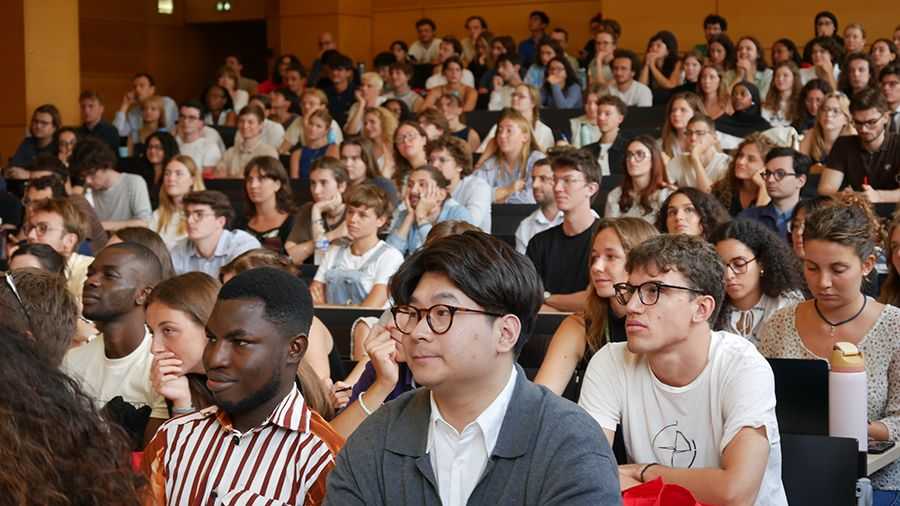
Ceremonial opening of the School of Research
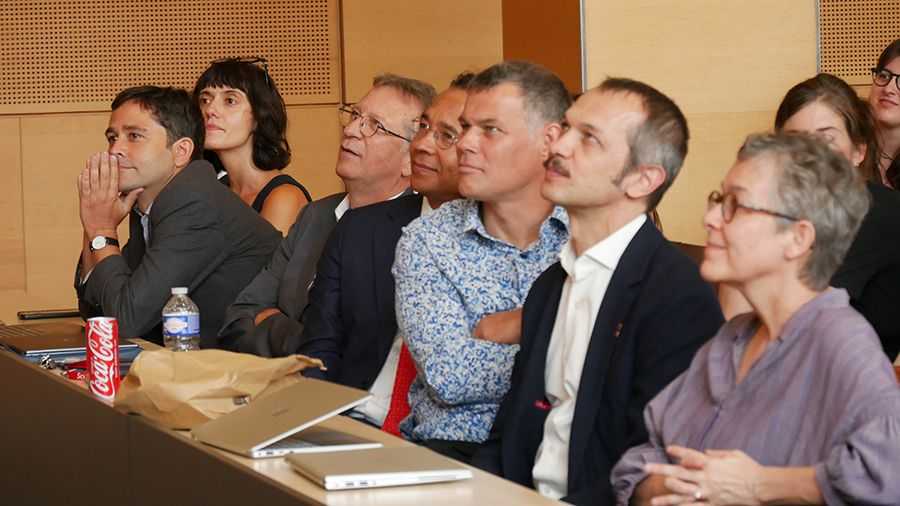
Heads of Studies and Scientific Directors
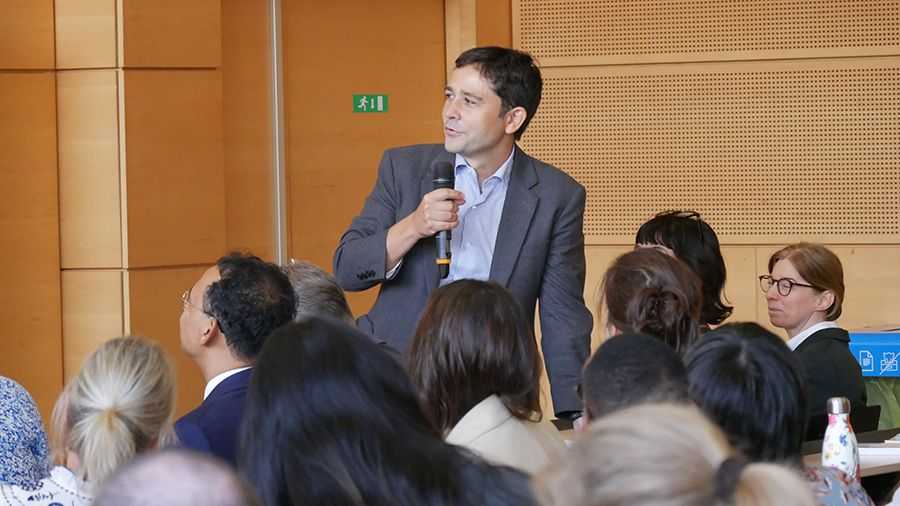
David Todd, Head of History Studies
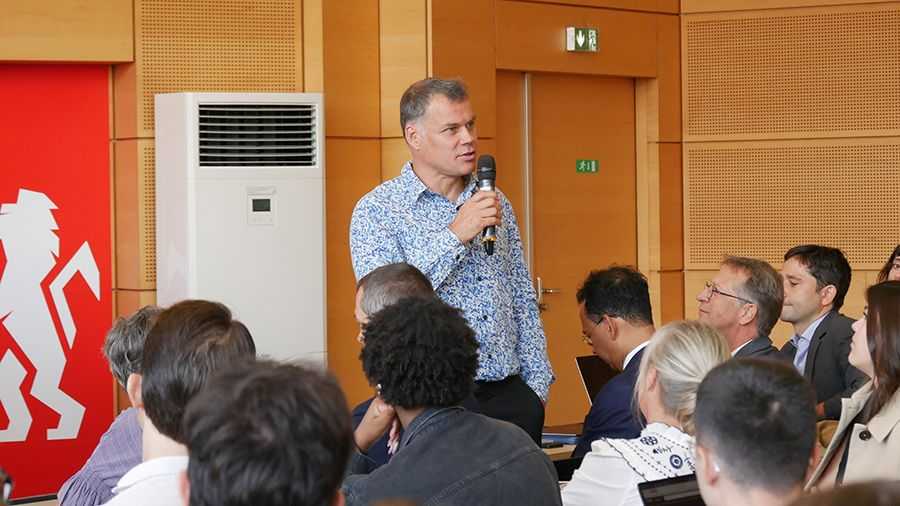
Jérôme Pélisse, Head of Sociology Studies
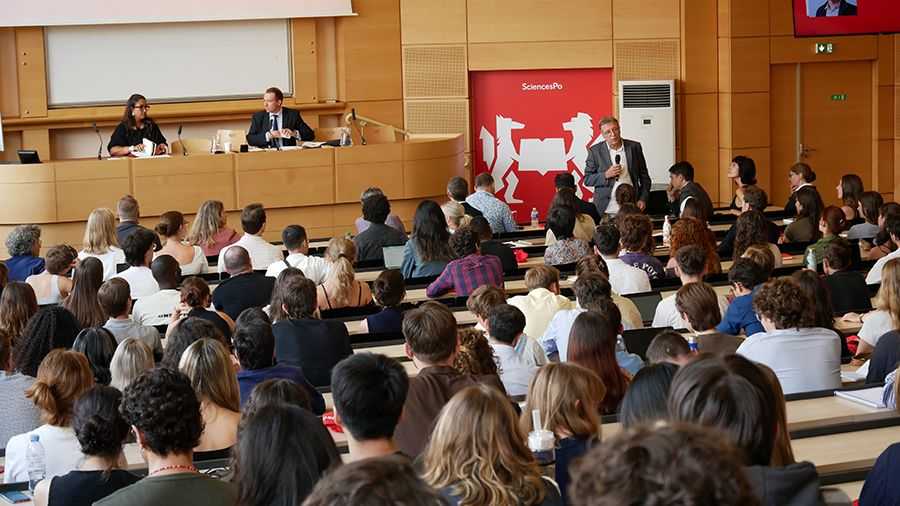
Pierre-Philippe Combes, Head of Economics Studies
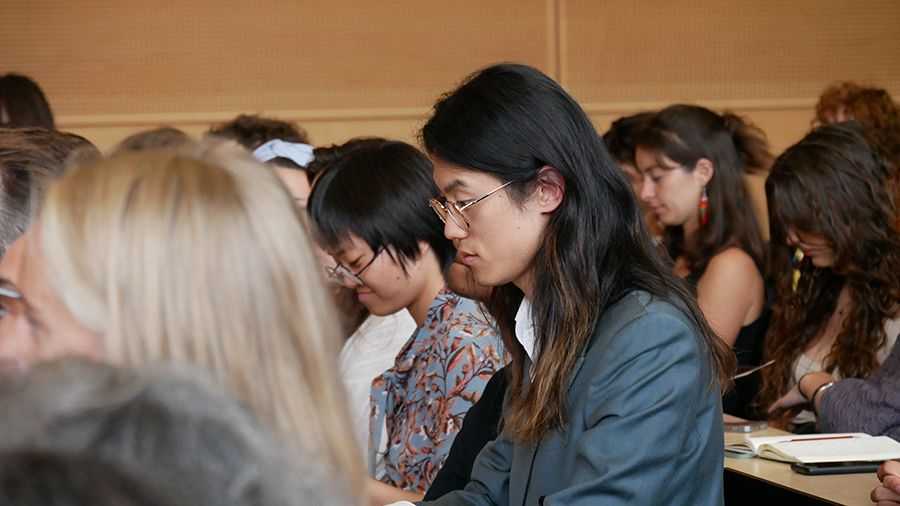
Ceremonial opening of the School of Research
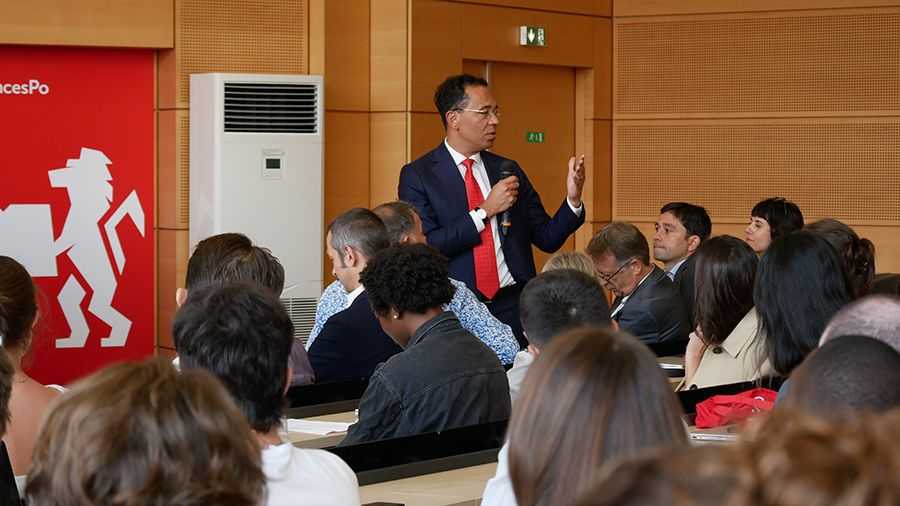
Thierry Balzacq, Head of Political Science Studies
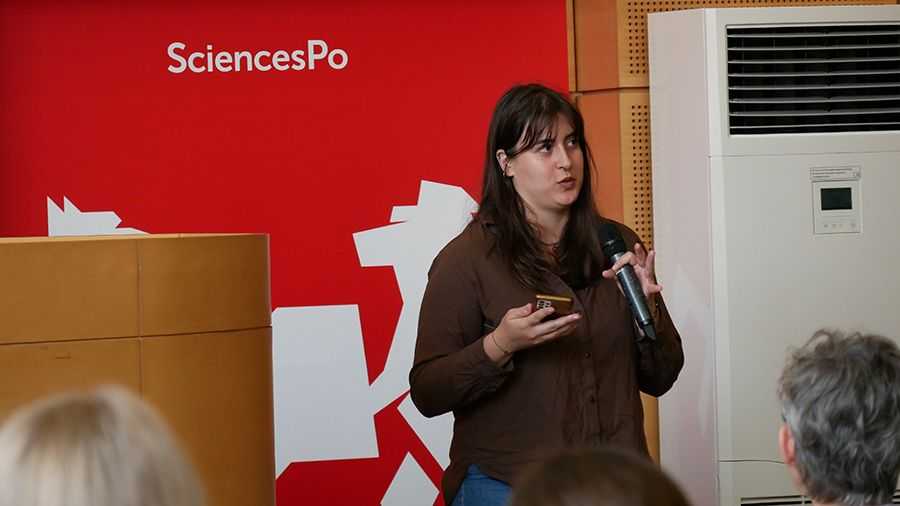
Presentation of School of Research Association (SORA)
Useful information
Academic integrity: the common framework in force at Sciences Po
Sciences Po is firmly committed to promoting ethics and scientific and academic integrity, which are the cornerstones of excellence in its research and teaching missions.
Sciences Po's educational project encourages its students to develop independent and critical thinking, intellectual honesty, and respect for copyright and image rights when using sources.
Combating gender-based and sexual violence
Because gender-based and sexual violence have no place at Sciences Po, the institution has implemented a comprehensive policy ranging from prevention to punishment of perpetrators of violence, with priority given to listening to and supporting victims.
If you have any questions or need support, please contact: referent.vss@sciencespo.fr or make an appointment online.
Combating discrimination
Because discrimination is a serious violation of human rights, the institution is committed to combating discrimination, thereby contributing to collective and individual well-being, inclusion and equality.
If you have any questions or need assistance, please contact: referent.lcd@sciencespo.fr
Disability & accessibility: support for students
If you have a temporary or permanent disability, or if you suffer from a disabling health condition, Sciences Po will ensure that your education and integration into student life run as smoothly as possible.
The Disability Support Centre is available to:
- take your needs into account;
- offer you specific accommodations;
- make courses and premises as accessible as possible;
- coordinate actions and information with the various Sciences Po departments;
- support you in your efforts.
Contact: pole.handicap@sciencespo.fr - 01 45 49 51 19
Student Services Centre - 1st floor, 13, rue de l'université
By appointment, Monday to Friday from 9.30am to 1pm and from 2pm to 5.30pm.
Health
Sciences Po has a ‘Health Centre’ staffed by several professionals (doctor, nurse, psychologist, etc.), located at 13 rue de l'Université, accessible to all students. Appointments can be made via Doctolib.
In addition, several members of the Research School team are trained in first aid.